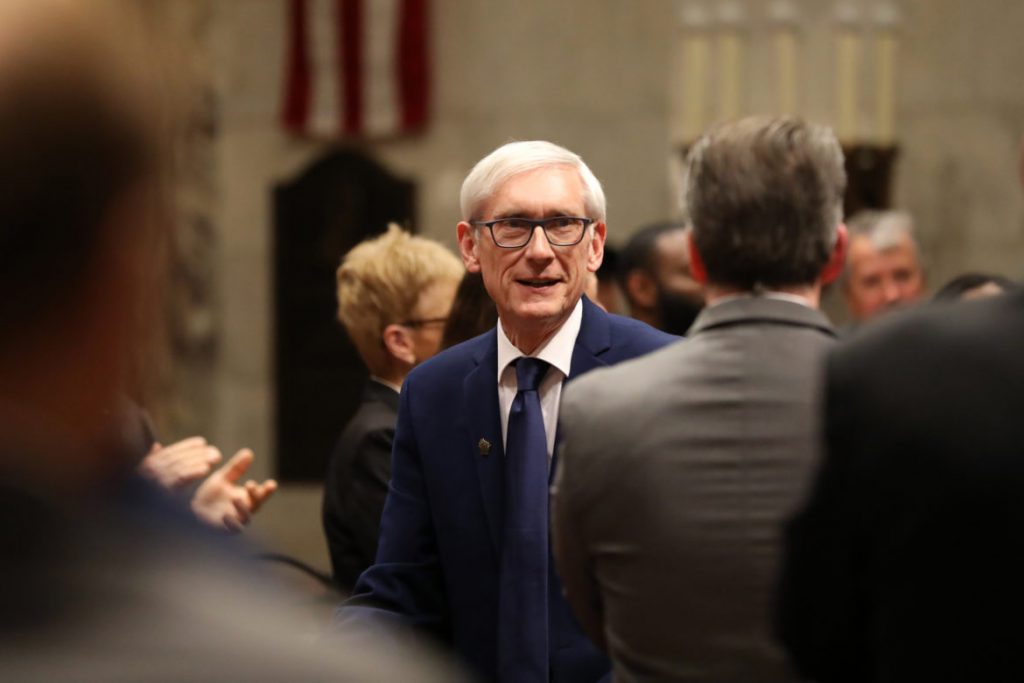Evers Predicts State Shared Revenue Changes
More money coming, 'I don't care if you’re a 300-people township or the city of Milwaukee.'
Gov. Tony Evers said Tuesday there “will be a change” in the state’s shared revenue funding for local communities, making a forceful commitment to an issue that’s been central to his administration.
“There’s no question about it,” Evers said Tuesday at a luncheon hosted by Wispolitics in downtown Madison.
In previous budgets, shared revenue funding has been a sticking point between the Democratic governor and Republicans who control the state Legislature. This session — the first of Evers’ second term in office — has seen more common ground emerge between the parties. Evers has proposed dedicating 20 percent of the state’s sales tax revenue for shared revenue, and while Republicans have not endorsed a specific number, they’ve said there’s a need to boost local government funding.
But earlier this month, Assembly Speaker Robin Vos, R-Rochester, tried to lower expectations about the amount of state money that would go to local communities, saying the state can’t afford the budget Ever unveiled last month. The governor on Tuesday acknowledged that pushback, but said GOP leaders need to propose alternatives.
“Let’s work through the budget,” Evers said, arguing the state’s historic surplus gives government leaders flexibility. “I think it’s way premature to say there’s not enough money since we know that there is $7 billion dollars there.”
Evers’ shared revenue proposal would amount to the largest increase in state aid for local communities in decades, according to an analysis from the Wisconsin Policy Forum. The dollar amount has decreased over decades, from more than $1 billion in the 1990s to about $900 million today, without factoring for inflation, per that report.
“That’s crazy,” Evers said on Tuesday. “I don’t care if you’re a 300-people township or the city of Milwaukee, you cannot operate with that.”
Evers has also proposed allowing municipalities to increase their own sales taxes to harness more revenue — if approved by voters — but Republicans have indicated that they will not support such a measure.
At another WisPolitics forum last week, Rep. Mark Born, R-Beaver Dam, one of the co-chairs of the Legislature’s Joint Finance Committee, said GOP leaders are unlikely to support any new taxes.
A push for bipartisan budget negotiations
GOP lawmakers have said for weeks they plan to scrap Evers’ entire budget proposal and start from base. At Tuesday’s luncheon, Evers downplayed these remarks, including recent comments from Vos minimizing the size of Wisconsin’s state budget.
“Instead of saying we don’t have enough money, tell me what the damn plan is,” he said. “I put my plan out there. I think it’s a reasonable plan. They need to get to work and get it done.”
Evers’ budget is crafted in part around a projected historic $7 billion budget surplus, which Evers has framed as a once-in-a-lifetime opportunity to invest in the state.
On Tuesday, Evers said Republican leaders need to be clear about alternatives, as he nodded to a host of his additional priorities, including expanding broadband access, funding child care and increasing education spending.
He also acknowledged the upcoming state Supreme Court election, in which the ideological balance of the state’s highest court could swing to the left. If it does, the court could reconsider the state’s existing legislative maps, which were drawn in a way that favors Republican lawmakers.
Maps that are drawn to more accurately represent the closely-divided Wisconsin electorate would force lawmakers to compromise more, Evers argued.
“It’s not that, if they were done fairly, that the Democrats would have the majority,” he said. “At the end of the day, what I believe is that if the makeup of the legislature is relatively close, it forces people to the middle.”
Listen to the WPR report here.
Gov. Evers says change is coming for state shared revenue system was originally published by Wisconsin Public Radio.
More about the Local Government Fiscal Crisis
- Mayor Johnson’s Budget Hikes Fees, Taxes In 2025, Maintains Services - Jeramey Jannene - Sep 24th, 2024
- New Milwaukee Sales Tax Collections Slow, But Comptroller Isn’t Panicking - Jeramey Jannene - Jun 28th, 2024
- Milwaukee’s Credit Rating Upgraded To A+ - Jeramey Jannene - May 13th, 2024
- City Hall: Sales Tax Helps Fire Department Add Paramedics, Fire Engine - Jeramey Jannene - Jan 8th, 2024
- New Study Analyzes Ways City, County Could Share Services, Save Money - Jeramey Jannene - Nov 17th, 2023
- New Third-Party Study Suggests How Milwaukee Could Save Millions - Jeramey Jannene - Nov 17th, 2023
- Murphy’s Law: How David Crowley Led on Sales Tax - Bruce Murphy - Aug 23rd, 2023
- MKE County: Supervisors Engage in the Great Sales Tax Debate - Graham Kilmer - Jul 28th, 2023
- MKE County: County Board Approves Sales Tax - Graham Kilmer - Jul 27th, 2023
- County Executive David Crowley Celebrates County Board Vote to Secure Fiscal Future and Preserve Critical Services for Most Vulnerable Residents - David Crowley - Jul 27th, 2023
Read more about Local Government Fiscal Crisis here




















